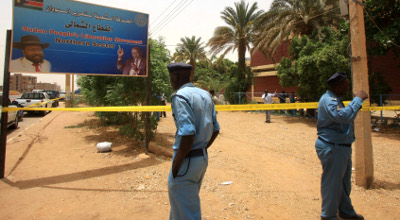After Khartoum denied that it had bombed civilians earlier this month, Sudanese aerial strikes last week were aimed at church buildings and schools in Kauda, South Kordofan state, a humanitarian aid worker said.
Antonov airplanes dropped bombs on March 22 and March 23, destroying some houses and cattle near the church buildings and schools but causing no casualties, he said.
Humanitarian agencies consider the Islamic government’s targeting of civilians in the Nuba Mountains, which has a large Christian population, an “ethnic cleansing” against non-Arab peoples in the multi-ethnic state, with the added incentive of ridding the area of Christians, he said.
Churches in the Nuba Mountains are holding worship services very early in the morning and late in the evening in order to avoid aerial bombardments that target their churches, he said. Most of the bombings take place during daytime, when visibility is better for pilots of the Russian-made Antonov planes.
Khartoum is actively recruiting more security personnel and sending them to South Kordofan to help kill or arrest Nuba civilians, including Christians, sources said. Islamic government officials consider the various Nuba ethnicities as enemies or “infidels” in their campaign to clear the region of non-Arab races and Christianity.
“These people are doing everything possible to make sure they get rid of Christianity from the Nuba Mountains–churches and church schools are the targets of both the Sudanese Armed Forces and its militias,” the aid worker aid, although mosques have also been targeted.
The Sudanese government has razed 10 church buildings and 17 mosques since fighting broke out last June, according to a report released on March 16 by the Arry Organization for Human Rights and Development. The South Kordofan-based organization reported that the Sudanese Armed Forces and allied militias have destroyed 73 villages and 48 schools.
Civilians in South Kordofan have fled by the thousands since last June. The U.N. Commissioner for Refugees estimates there are 185,000 refugees from South Kordofan and Blue Nile states in South Sudan and Ethiopia. The United Nations estimates the conflict has made refugees of a total of 400,000 people, with 120,000 of them internally displaced within Sudan.
Some 300,000 of those who have fled are in danger of starving.
The killing of a Nuba political activist in Khartoum this month has elevated fears of the estimated 120,000 Internally Displaced People from the Nuba Mountains, most of whom are Christians. In early March, Public Order Police shot dead Awdeia Ajabana at her home in the Aldeam area south of Khartoum; she was reportedly arguing with officers who saw her brother drinking alcohol on her family’s front doorsteps and who assaulted him.
A candidate for the National Labour Party in 2010 elections originally from the Nuba Mountains, the 39-year-old Ajabana was likely targeted for her political activity but also for her race as a Nubian woman. Other members of her family also were reportedly shot in the incident.
Following a vote last year for southern Sudan to secede, Christians in Khartoum, especially those from the Nuba Mountains, say that they live in a state of uncertainty as they fear hostilities against them will increase ahead of an April 8 deadline to leave Sudan or undergo the complex process of becoming citizens.
“We are living in great fear as far as our security is concerned,” a church leader in Khartoum told Compass on condition of anonymity.
Fighting in South Kordofan, a major battleground during Sudan’s 1983-2005 civil war, broke out again in June 2011 as Khartoum moved to assert its authority against gunmen formerly allied to the now independent South Sudan. The conflict between President Omar al-Bashir’s forces and the Sudan People’s Liberation Movement-North (SPLM-N) spread from South Kordofan to Sudan’s Blue Nile state in September 2011.
When the Comprehensive Peace Agreement was signed in 2005, the people of South Kordofan were to decide whether to join the North or the South, but the state governor, wanted for war crimes himself, suspended the process, and Khartoum instead decided to disarm the SPLM-N by force.
Sudan’s Interim National Constitution holds up shariah (Islamic law) as a source of legislation, and the laws and policies of the government favor Islam, according to a U.S. Department of State report. On several occasions in the past year, Bashir has warned that Sudan’s constitution will become more firmly entrenched in shariah.











































